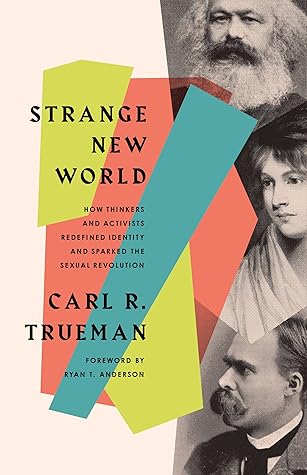More on this book
Community
Kindle Notes & Highlights
Read between
January 14 - January 16, 2023
The modern self assumes the authority of inner feelings and sees authenticity as defined by the ability to give social expression to the same. The modern self also assumes that society at large will recognize and affirm this behavior. Such a self is defined by what is called expressive individualism.
If the original, pristine individual is the truly authentic me, then not just institutions but every other person stands in a naturally adversarial relationship to me. Everyone else is first and foremost a potential threat to my authenticity.
If there is no God, then men and women cannot be made in his image and are not therefore required to act in accordance with that image. And if men and women are not made in God’s image, to what absolute moral standard must they submit themselves?
In biblical times or in ancient Greece, sex was regarded as something that human beings did; today it is considered to be something vital to who human beings are.
We no longer think of ourselves as subject to the world’s fixed nature, or of it as having an objective authority or meaning. We are the ones with power, and we are the ones who give the world significance.
The traditional Christian idea that sex is the seal on a unique interpersonal, lifelong, exclusive relationship between one man and one woman, and therefore has meaning only in the context of that relationship, is not part of the philosophy of pornography.
Nations almost by definition involve so vast an area of geographical space, such large populations, and so many individual communities—villages, towns, cities—that it is impossible for everyone to know everyone else. This means that, for a nation to exist, its members must imagine that they hold things in common that give them a coherent identity as a body of people.
The ability for a single narrative, or a small handful of narratives, to dominate the airwaves is long past. In this sense, we might argue that there is one unifying narrative that lies behind the diversity of competing narratives on offer. It is that of the power of the individual to choose his or her identity.
To tolerate somebody is, by definition, to disapprove of them, albeit in a rather passive way. But it is also not to recognize them, as we defined recognition earlier: it is not to affirm their identities as they wish to be affirmed; at best, it is to keep them in place as second-class members of society.
We might say that happiness is for each of us first and foremost an individual thing, resting upon us being independent; all other relationships must serve that end or be seen as oppressive.
The most powerful witness to the gospel is the church herself, simply going about the business of worship.
Many Christians talk of engaging the culture. In fact, the culture is most dramatically engaged by the church presenting it with another culture, another form of community, rooted in her liturgical worship practices and manifested in the loving community that exists both in and beyond the worship service.
The church protests the wider culture by offering a true vision of what it means to be a human being made in the image of God.


